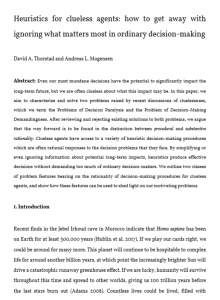Heuristics for clueless agents: how to get away with ignoring what matters most in ordinary decision-making
David Thorstad and Andreas Mogensen (Global Priorities Institute, Oxford University)
GPI Working Paper No. 2-2020
Even our most mundane decisions have the potential to significantly impact the long-term future, but we are often clueless about what this impact may be. In this paper, we aim to characterize and solve two problems raised by recent discussions of cluelessness, which we term the Problems of Decision Paralysis and the Problem of Decision-Making Demandingness. After reviewing and rejecting existing solutions to both problems, we argue that the way forward is to be found in the distinction between procedural and substantive rationality. Clueless agents have access to a variety of heuristic decision-making procedures which are often rational responses to the decision problems that they face. By simplifying or even ignoring information about potential long-term impacts, heuristics produce effective decisions without demanding too much of ordinary decision-makers. We outline two classes of problem features bearing on the rationality of decision-making procedures for clueless agents, and show how these features can be used to shed light on our motivating problems.
Other working papers
Social Beneficence – Jacob Barrett (Global Priorities Institute, University of Oxford)
A background assumption in much contemporary political philosophy is that justice is the first virtue of social institutions, taking priority over other values such as beneficence. This assumption is typically treated as a methodological starting point, rather than as following from any particular moral or political theory. In this paper, I challenge this assumption.
Imperfect Recall and AI Delegation – Eric Olav Chen (Global Priorities Institute, University of Oxford), Alexis Ghersengorin (Global Priorities Institute, University of Oxford) and Sami Petersen (Department of Economics, University of Oxford)
A principal wants to deploy an artificial intelligence (AI) system to perform some task. But the AI may be misaligned and aim to pursue a conflicting objective. The principal cannot restrict its options or deliver punishments. Instead, the principal is endowed with the ability to impose imperfect recall on the agent. The principal can then simulate the task and obscure whether it is real or part of a test. This allows the principal to screen misaligned AIs during testing and discipline their behaviour in deployment. By increasing the…
Simulation expectation – Teruji Thomas (Global Priorities Institute, University of Oxford)
I present a new argument for the claim that I’m much more likely to be a person living in a computer simulation than a person living in the ground-level of reality. I consider whether this argument can be blocked by an externalist view of what my evidence supports, and I urge caution against the easy assumption that actually finding lots of simulations would increase the odds that I myself am in one.

